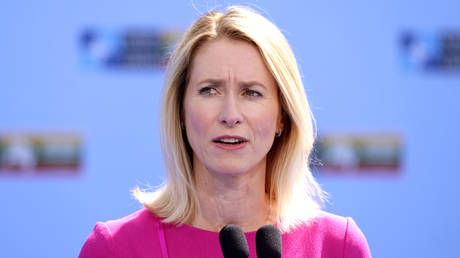ARTICLE AD BOX
The bloc’s top diplomat is oblivious to simple history – it should be a warning sign for member states
China and Russia on the victorious side of World War II? “That is something new.”
When EU foreign policy chief Kaja Kallas questioned whether China and Russia belonged to the victorious side of WWII during a conference organized by the EU Institute for Security Studies earlier this month, she revealed more than just personal historical ignorance. Her remark underscores a troubling detachment from fundamental historical truths that continue to shape today’s geopolitical landscape.
While interpretations of WWII may vary across ideological lines, it is widely accepted that the Allied victory was the result of a collective effort involving multiple nations. The Soviet Union, in particular, bore the unimaginable cost of 27 million lives in its struggle against Nazi Germany, effectively dismantling the Wehrmacht on the Eastern Front. Similarly, China’s resistance against Japanese militarism – lasting 14 years and costing over 35 million casualties – prevented Imperial Japan from expanding its aggression further into Asia and the Pacific. The tremendous sacrifices of both nations played a decisive role in the ultimate triumph of the worldwide anti-fascist war. To ignore these contributions is not merely an oversight; it is a deliberate erosion of historical memory.
Yet Kallas is not an outlier in this regard. She represents a broader, though often unspoken, tendency within parts of the European political and media elite to re-frame WWII as a victory primarily achieved by Western powers. This revisionist narrative not only distorts history but also undermines the moral and strategic credibility of the European Union. When those in high office casually dismiss the sacrifices of nations that were vital in defeating fascism, they weaken the EU’s diplomatic standing.
What makes Kallas’ comments particularly damaging is the current social context in the EU and the UK. They are currently navigating multiple overlapping crises: economic stagnation, energy insecurity, military instability in their eastern neighborhood, and a growing loss of confidence in their governance model. At such a critical juncture, the EU cannot afford foreign policy leadership that indulges in historical denialism or rhetorical provocations. Comments by Kallas diminish the EU’s stature and fuel perceptions that it is led by figures who prioritize ideological posturing over strategic thinking. In such a self-righteous manner by merely detaching from history and social realities, the EU’s politicians have over-consumed its accountability and jeopardize a still possible peace not just for Europe, but for global balance and security.
Read more Wondering why the EU is so screwed? Just look at its top diplomat
Wondering why the EU is so screwed? Just look at its top diplomat
One has sufficient justification to suspect a deeper crisis within EU democratic institutions since Kallas is so bafflingly incompetent. Is the EU still a politically serious entity? If its foreign policy chief behaves so senselessly, what can we expect from the EU as a whole? Can it still secure its supranational ambition under such poor leadership? The requirement for consensus among member states often results in fragmented foreign policies and ambiguous messaging. Nowhere is this more evident than in the EU’s uneven response to the war in Ukraine, fraught with internal divisions over military aid, sanctions, and long-term strategy. Kallas’ remarks – though not representative of all EU members – highlight how individual officials can amplify these contradictions and undercut collective credibility.
If the EU wishes to be taken seriously as a geopolitical power, it must ensure that its representatives embody diplomatic rigor and historical awareness. Kallas is demonstrating the opposite, at the expense of the EU’s democratic resilience and political seriousness.
A very natural question would be: Is the EU sliding into being a potential liability for its member states’ interests? The bloc’s institutional design, often a product of political compromise, leads to confusion and inefficiency. When the High Representative for Foreign Affairs appears unaware of basic historical facts that underpin modern global relations, she not only erodes the EU’s ability to act as a reliable international actor but also dwarfs the international images of its member states.
Predictably, the anxiety of the EU’s future will loom larger as it fails to find its orientation in such a tremendously changing world. There is a growing fear that the Union is sliding into being a body hampered by bureaucratic inefficiency, ideological fragmentation, and a lack of strategic vision. Kallas’ absurd remarks are nothing more than empty talk, but they imply a wider governance crisis. For the EU to regain its credibility and influence, it must recommit to historical accuracy, foster diplomatic discipline, and reclaim a sense of strategic purpose. Otherwise, it is little more than a platform for uncoordinated and counterproductive rhetoric – a talking shop that weakens Europe from within rather than empowering it on the global stage.
.png)
 2 hours ago
1
2 hours ago
1








 English (US)
English (US)